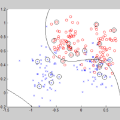While machine learning can myopically reinforce social inequalities, it may also be used to dynamically seek equitable outcomes. In this paper, we formalize long-term fairness in the context of online reinforcement learning. This formulation can accommodate dynamical control objectives, such as driving equity inherent in the state of a population, that cannot be incorporated into static formulations of fairness. We demonstrate that this framing allows an algorithm to adapt to unknown dynamics by sacrificing short-term incentives to drive a classifier-population system towards more desirable equilibria. For the proposed setting, we develop an algorithm that adapts recent work in online learning. We prove that this algorithm achieves simultaneous probabilistic bounds on cumulative loss and cumulative violations of fairness (as statistical regularities between demographic groups). We compare our proposed algorithm to the repeated retraining of myopic classifiers, as a baseline, and to a deep reinforcement learning algorithm that lacks safety guarantees. Our experiments model human populations according to evolutionary game theory and integrate real-world datasets.
翻译:机器学习可能会短视地加强社会不平等,但也可以用于动态地寻求公平的结果。在本文中,我们在在线强化学习的背景下正式化了长期公平性。这种形式化可以容纳动态控制目标,例如驱动种群状态内在的公平性,这些目标无法纳入公平的静态形式化。我们证明这种框架允许算法通过牺牲短期激励来适应未知的动态环境,以驱动分类器-人口系统朝向更理想的均衡发展。针对这个设置,我们开发了一种算法,将最近的在线学习工作加以改进。我们证明这个算法实现了对累积损失和公平违规的同时概率限制(作为不同人口群体之间的统计规律)。我们将我们提出的算法与基准的短视分类器的重复训练以及缺乏安全保障的深度强化学习算法进行了比较。我们的实验以演化博弈理论为基础,并结合了真实世界数据集。


